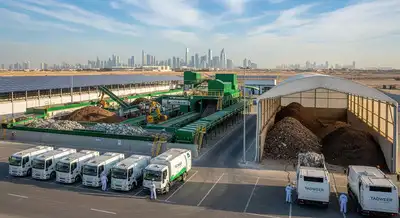
Workers manage sorted waste at a recycling facility in the Gulf region, reflecting growing efforts in waste treatment/ Representative Image
TL;DR
- GCC countries collected over 260 million tons of waste in 2023, more than double since 2019.
- Household waste per person dropped by 17%, even as total waste rose.
- Medical and industrial waste treatment capacity expanded significantly after COVID-19.
The Gulf Cooperation Council (GCC) countries have made major changes in how they handle waste. By the end of 2023, the total waste collected across Saudi Arabia, UAE, Kuwait, Oman, Qatar, and Bahrain reached nearly 263 million tons.
That’s more than double the amount collected in 2019. This jump shows how much the region is growing, but also the challenge it faces in managing all that waste.Interestingly, while the total waste collected grew a lot, the amount of household waste each person produces has actually gone down. On average, people now create about 1.4 kilograms of household waste a day, which is 17% less than before. This suggests some positive changes in how waste is managed at home.According to data released by the Statistical Centre for the Cooperation Council for the Arab Countries of the Gulf and reported by WAM, this increase in waste collection marks a 153.7% rise since 2019.
More waste treated, less harmful impact
Out of the total waste collected, about 192 million tons were treated properly. That means a big chunk didn’t just sit in dumps but went through recycling, recovery, or safe disposal. Most of the waste in the GCC is non-hazardous, nearly 99%.
Hazardous waste, on the other hand, is often sent abroad for treatment, with around 96% exported to other countries. This is part of the GCC’s effort to meet international standards, including the Basel Convention, which focuses on controlling hazardous waste.One good sign is that the region is hitting targets related to reusing and recycling hazardous waste. In 2023, 30% of hazardous waste was recycled or reused, meeting a key Sustainable Development Goal.
Medical and industrial waste: handling the aftermath of COVID-19
Medical waste in the GCC saw some shifts after the pandemic. The total hazardous waste from healthcare dropped by over 11% compared to the previous year. Meanwhile, countries have boosted their capacity to deal with medical waste. The number of medical waste incineration facilities grew by nearly 28%, with the ability to handle more than double the amount of waste compared to 2022.Industrial hazardous waste, however, went up by almost 24%.
This increase likely ties back to post-pandemic industrial activity picking up.
Household, agricultural, and municipal waste trends
Household waste in the GCC reached its highest point in 2020, but since then, it’s been slowly declining. In 2023, about 30.8 million tons of household waste were collected, down from a peak of 35.5 million tons. On the flip side, agricultural waste collection is rising. It jumped 44% last year to 2.5 million tons. Municipal waste from other sectors also increased, from 11.9 million tons in 2019 to 14.3 million tons in 2023.
Looking ahead: a growing waste management market
The GCC’s waste management sector is expected to keep growing. Reports suggest the market will be worth around $68 billion by 2025 and could reach nearly $97.5 billion by 2030. That means countries in the Gulf are investing more in managing waste better and turning it into resources where possible.
FAQ
- 1. Why is the total waste increasing but household waste per person is decreasing?
Population growth and industrial activity add to total waste. But better awareness and waste management at home help reduce per-person household waste.
- 2. What happens to hazardous waste in the GCC?
Most hazardous waste is sent abroad for treatment. The region recycles or reuses a growing share, following international guidelines.
- 3. How has COVID-19 affected waste management in the GCC?
Medical waste increased during the pandemic but has started to decline. At the same time, the region expanded its facilities to handle medical waste safely.

 1 day ago
2
1 day ago
2










 English (US) ·
English (US) ·